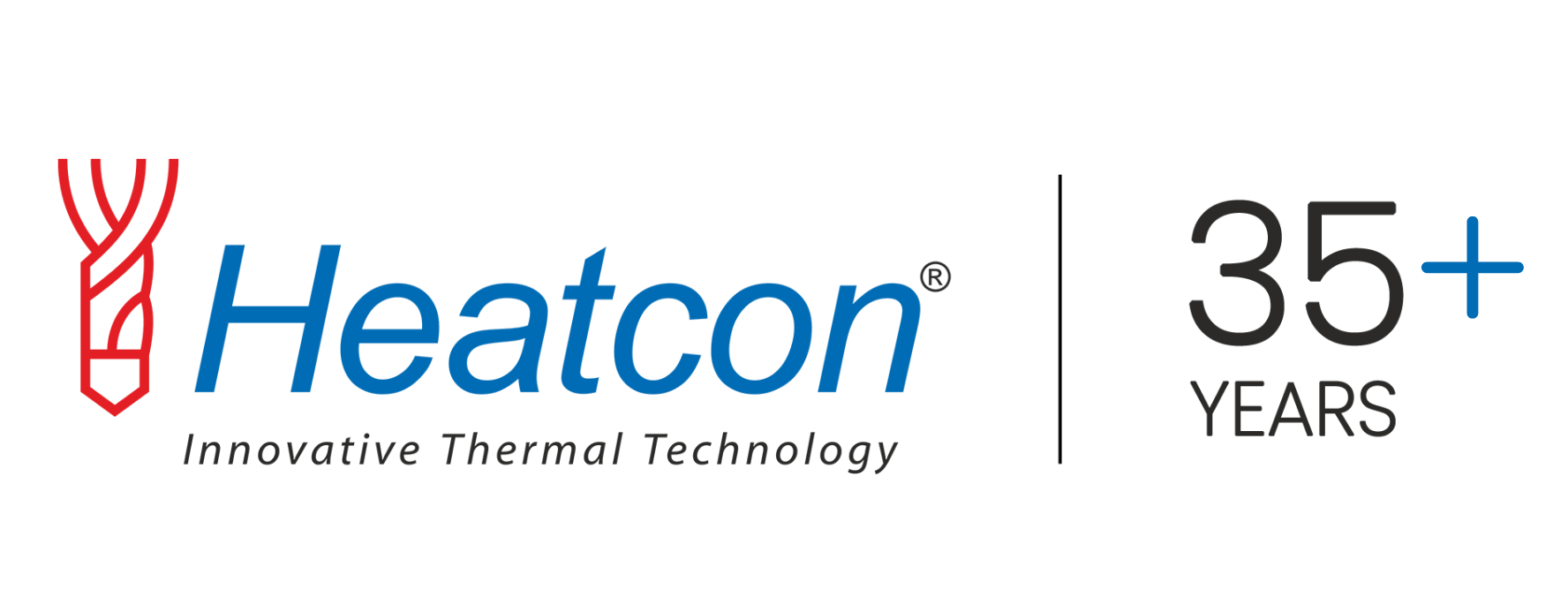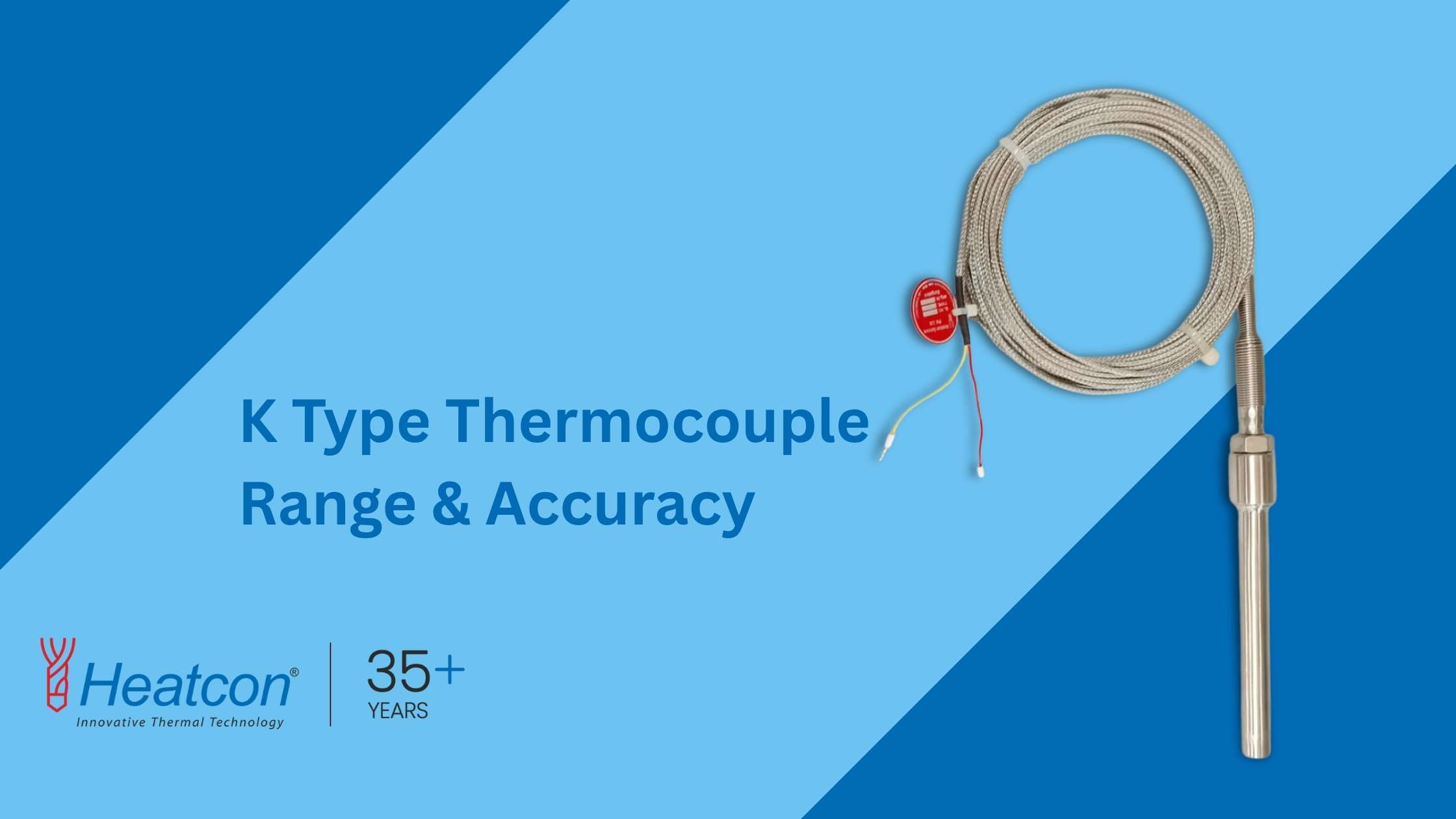Did you know that K type thermocouples account for nearly 60% of global thermocouple usage according to industry reports? This statistic reflects their versatility, wide K type thermocouple range, and dependable performance across industries. From steel plants and glass furnaces to aerospace and pharmaceuticals, this thermocouple type has become the gold standard for reliable temperature sensing. However, the real difference in performance comes when these thermocouples are designed and manufactured with precision — and that is where Heatcon Sensors stands out as a trusted partner.
What is the K type thermocouple range?
The K type thermocouple range typically spans from -200°C to +1372°C, offering one of the broadest operating ranges among thermocouple types. This makes it suitable for both cryogenic processes and high-temperature industrial environments. Its ruggedness and affordability have made it an industry staple. For specialized industries requiring exceptional performance, Heatcon Sensors custom-manufactures these sensors to match exact requirements, whether for a food processing line in India or a petrochemical plant in Saudi Arabia.
Why thermocouple accuracy matters
Thermocouple accuracy is critical because even minor deviations can compromise product quality, safety, or compliance. K type thermocouples typically have an accuracy of ±2.2°C or ±0.75% of reading, depending on calibration. Heatcon Sensors goes further by ensuring each thermocouple passes rigorous quality checks and meets global standards, giving industries peace of mind in processes where accuracy can mean the difference between efficiency and costly downtime.
Understanding temperature measurement range
The temperature measurement range of a thermocouple defines its usability in varied industries. K type sensors, due to their Nickel-Chromium/Nickel-Alumel composition, cover one of the broadest ranges. This wide usability ensures they are equally effective in energy, chemical, and aerospace sectors. At Heatcon Sensors, custom engineering ensures that whether your requirement is for a narrow measurement window in sensitive lab experiments or for extreme ranges in furnaces, the right configuration is delivered on time.
Insulated applications and their benefits
When it comes to insulated applications, K type thermocouples can be designed with mineral insulation to resist mechanical and thermal stress. This insulation reduces electrical interference and enhances signal integrity. Heatcon Sensors builds insulated designs for industries like automotive testing, where vibration and noise can otherwise compromise accuracy.
Bare wire applications and where they fit
Bare wire applications use exposed thermocouple wires for rapid response in dynamic environments. While they offer faster readings, they are best suited for controlled laboratory setups or temporary installations where contamination is minimal. Heatcon Sensors provides these with tailored wire lengths, junction types, and calibrations to serve research facilities, universities, and specialized production lines across India, the UAE, Germany, and beyond.
Tolerance class and industry standards
Every thermocouple must conform to a tolerance class. According to IEC 60584 standards, Class 1 tolerance provides the highest precision, whereas Class 2 allows for broader deviations. Heatcon Sensors ensures compliance with both national and international standards, while offering guidance on selecting the right class for your unique process requirements. Clients benefit from solutions that meet certification standards demanded by global industries.
Special limits of error explained
The concept of special limits of error refers to the tighter tolerance levels achievable under controlled manufacturing. For example, instead of a ±2.2°C deviation, special limits can ensure accuracy within ±1.1°C. Heatcon Sensors manufactures K type thermocouples with special limits of error when ultra-precise monitoring is required in applications such as semiconductor manufacturing or aerospace engine testing.
Ensuring EMF stability
EMF stability is a vital parameter, as the thermoelectric effect generates voltage differences that directly influence readings. Over time, drift in EMF can distort results. Heatcon Sensors designs sensors with stable alloys and protective sheaths that maintain EMF stability across years of operation, significantly reducing recalibration needs and ensuring consistent reliability.
Heatcon Sensors: A complete solution provider
Heatcon Sensors is not only a manufacturer of thermocouples but also a trusted provider of allied heat-generating equipment. Their portfolio includes:
- Industrial furnaces and electric furnaces
- High-temperature ovens
- Hot air blowers
- High density cartridge heaters
- Custom-designed heating elements for process industries
This integrated offering allows industries to source both sensors and heating solutions from a single, dependable manufacturer — reducing procurement complexities and ensuring compatibility.
Why choose Heatcon Sensors?
Choosing Heatcon Sensors means gaining access to decades of expertise, world-class manufacturing, and a global delivery network. The company has supplied customized temperature sensors to clients not only in India but also across the US, UAE, Indonesia, Germany, South Korea, Saudi Arabia, Russia, Bahrain, and Kuwait. By focusing on innovation and customer-specific designs, Heatcon ensures clients are never left behind in competitive industries.
About Heatcon Sensors
Heatcon Sensors is a Bangalore-based company specializing in the design and manufacture of temperature sensors, RTDs, thermocouples, and industrial heating solutions. Their emphasis on customization, precision, and global service reach makes them a reliable partner for industries worldwide. Customers can connect via three convenient channels:
- Submit your details on the official contact form
- Leave a message on WhatsApp through the Heatcon Sensors website
- Call directly at +91 9164833027 or +91 9844233244
K type thermocouple range & accuracy: Frequently asked questions
Short answer: The K type thermocouple range typically spans from about −200 °C to +1260–1372 °C (process-dependent), making it a versatile choice for cryogenic monitoring, ovens, kilns, and high-temperature process lines.
Heatcon Sensors designs K-type probes for metals, glass, chemicals, food processing, and energy sectors. We match sheath alloys, junction styles, and lead configurations to your process so you get reliable readings across the stated span without compromising durability or response time.
Short answer: Typical thermocouple accuracy for K-type in standard grade is ±2.2 °C or ±0.75% of reading (whichever is greater). Choice of tolerance class, calibration method, installation technique, and environment strongly influence real-world performance.
- Tolerance and calibration: Selecting the right tolerance class and requesting calibration at your operating points reduce uncertainty.
- Junction and sheath: Grounded vs. ungrounded junctions and suitable sheath alloys limit noise and corrosion.
- Lead integrity: Proper extension/compensating cables and connectors preserve accuracy.
Heatcon Sensors supplies individually tested K-type probes with optional calibration certificates so your target accuracy is achieved in situ.
Short answer: Your temperature measurement range is the minimum-to-maximum span your sensor must reliably cover under actual operating conditions, including start-up, upset, and cleaning cycles.
Heatcon Sensors helps map each phase of your process so the chosen probe survives thermal cycling and delivers stable output across the defined range. We align sheath diameter, mineral insulation density, and junction type to your ramp rates and dwell temperatures.
| Condition | Design hint |
|---|---|
| Fast ramp & transients | Small OD sheath, grounded junction for speed |
| Electrical noise risk | Ungrounded junction, twisted pair leads |
| Corrosive gases | Protective sheath (Inconel/Hastelloy), proper sealing |
Short answer: Choose insulated applications (typically ungrounded junctions and high-density mineral insulation) when you need electrical isolation, lower noise pickup, and improved measurement stability in VFD-rich or high-EMI environments.
Heatcon Sensors engineers ungrounded junction K-types with compact OD sheaths to balance isolation and response time, ideal for PLC/DAQ systems and multi-sensor arrays where crosstalk or ground loops would otherwise degrade data quality.
Short answer: Use bare wire applications for rapid response in clean, controlled environments—such as labs, test rigs, and short-term trials—when exposure risk and mechanical stresses are minimal.
Heatcon Sensors supplies matched K-type wire spools, bead-welded junctions, and ceramic supports for bench setups. For production duty, we generally recommend sheathed MI probes to improve longevity and repeatability.
Short answer: Special limits of error are tighter manufacturing tolerances on alloy composition and calibration that reduce measurement uncertainty compared with standard grade wire.
Order special limits for critical control loops, product release checkpoints, and regulatory audits. Heatcon Sensors provides K-type probes with enhanced tolerances and optional multi-point calibration to anchor accuracy where it matters most.
Short answer: EMF stability determines how consistently the thermoelectric voltage relates to temperature over time. Drift erodes correlation, causing creeping offsets that hide in plain sight.
Heatcon Sensors controls alloy purity, cold-end hardware, and insulation compaction to minimize drift. We also advise on cable routing, connectors, and reference junction handling so your signal chain remains trustworthy across maintenance cycles.
Short answer: Yes. Heatcon Sensors manufactures custom RTDs, K-type thermocouples, and allied heating solutions—industrial ovens, electric furnaces, hot air blowers, high density cartridge heaters—and ships across India and worldwide.
To get a spec-matched quotation, submit your requirement, message via the website WhatsApp interface, or call +91 9164833027 / +91 9844233244 for immediate assistance.


